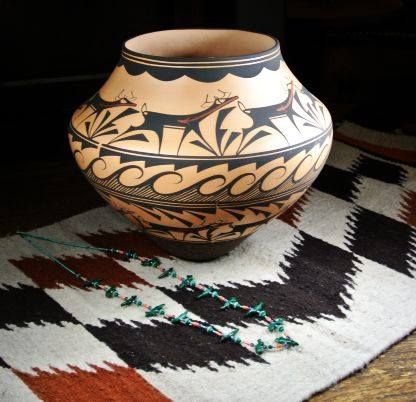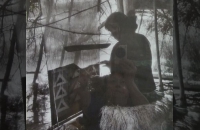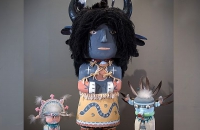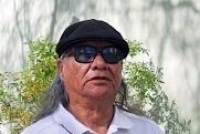P416 Zuni pot by Zuni master potter ANDERSON PEYNETSA. The 10.5” x 11” tan pot has a black deer and wave motif.
Zuni pottery artists often create extravagant geometric designs, many which incorporate zig zag lines which represent running water.
Anderson’s work displays the range of characteristic styles and designs of traditional Zuni pottery.
Call for Shipping
About the Potter:
ANDERSON PEYNETSA
ZUNI
Anderson’s pots are built the way Zuni potters before him have made their pots – from hand-rolled, thin coils of clay. The shapes of his pieces are pleasing to the eye and are impeccably gracious in aesthetic and even in shape. Anderson gets his design ideas for his works from old Zuni pottery and interprets these early images to create his contemporary designs. His line art and images are precise and create elegant flowing lines that are very well balanced. His painting has matured into a fluid, rhythmic style. Like most pueblo potters, he makes his paints from earth and plant pigments. He paints with black and reddish-brown pigments on either pure white or dark, earthy red highly polished backgrounds.
Working as a team, Anderson and his wife Avelia have developed a rhythm to their work and a cohesive elegant style. Avelia sands and polishes the pottery. Anderson says that she has the touch for that – he breaks the pots when he tries to polish. Pots are made in the morning and painted at night. Small pots dry in one afternoon; large ollas dry for several days. He applies his white slip evenly and rather liberally – the color of clay body of the pot does not show through. He also has a very steady hand with the paintbrush and is very good at loading his brushes to deliver an even application of pigment over the surface of the pot (no thin spots in the color).
The Peynetsa family is well known in collector circles. Anderson’s sister Agnes makes smaller pieces, most of which are adorned with lizards and frogs, animal symbols that are very esteemed by the Zuni. Even though Avelia is more than happy to let the spotlight shine on her husband, she, too, makes pots.
Anderson and Avelia learned their craft at Zuni High School from Jennie Laate (an accomplished Acoma potter who taught at Zuni), and he has been a potter ever since. Working as potters is how this family makes their living – this is not a part-time occupation. Anderson may be close to being middle-aged and is in the prime of his craft. We look forward to watching his work change in the years to come as he grows as an artist.
Anderson’s hands – they so clearly look like the hands of someone who works with a wet medium. Clay is very drying as it sucks the oils from the surface of skin. And, preparing clay from rock sherds is a laborious, hands-on job. He, like other Zuni potters and his ancestors, dig their own clay on the pueblo lands in a sacred place where only the potters are allowed to go.
After digging the clay from the earth, the clay is hauled to their home and soaked in water for 2-3 days to soften. Sometimes small, broken pieces of pottery sherds are added to the clay for suppleness if needed. Excess water is drained away, and the clay in put in pillow cases outside to rest….then the real work begins.
Anderson started to make pottery in the eighth grade of school and his pottery has a very distinctive and beautiful style. Anderson has won numerous awards for his works and has been invited to the Heard Museum (Phoenix, Arizona) many times and participates in the Indian Market is a once a year juried show of Native American art held in the streets of downtown Santa Fe on the 3rd weekend of August and produced by SWAIA. (Southwest Association for Indian Arts: for over 80+ years this is the largest and most prestigious intertribal fine art market in the world.)














